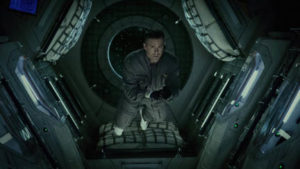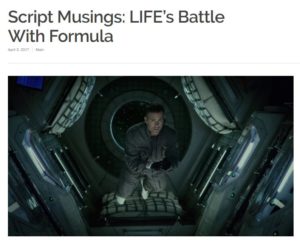
Ryan Reynolds in the sci-fi horror film “Life”
By Valerie Kalfrin
The Script Lab, April 3, 2017
Stop me if you’ve heard this one: A hodgepodge of people encounters something that they investigate further, only to be picked off one by one.
Of course, I could be talking about any number of excellent films (as well as some decidedly less excellent ones), all of which follow the same basic set-up. From MacReady and company, trapped in the cold, dark of Alaska, to Ripley and crew aboard the Nostromo. Every genre has its formulas, after all — familiar templates and structural conceits that pop up again and again. In fact, a solid formula can offer a strong foundation for bold new twists, fresh ideas and artistic experimentation. The trick (if you can even call it that) lies in balancing all the familiar tried and true with something that feels genuinely alive and new. But how exactly does one find that balance? How much can a film rely on a tried-and-true premise before genre-fatigue sets in? Just how far does “influence” go before an “homage” becomes a retread?
Life, the latest entry in this particular branch of sci-fi/horror, doesn’t quite inject new life into the formula, but it does offer gratifying surprises. Released two months prior to Alien: Covenant, this film is bound to draw comparisons to the famed franchise, which itself continues the same “creature killing off the crew” premise introduced in 1979’s Alien. Whether it manages to fully transcend its influences remains up for debate, though Life veers into just enough new territory that genre fans will find it entertaining.
For starters, it has a refreshing present-day setting aboard the International Space Station (complete with stunning views of the Earth and credited cooperation from NASA). Director Daniel Espinosa (Safe House, Child 44) makes the most of this location little seen beyond the realm of nonfiction. The camera follows characters gliding like fish through corridors in zero gravity and even turns upside-down.
The astronauts are assigned to recover a capsule knocked off its Earth-bound trajectory after probing for signs of life on Mars. Within tiny tweezer bits of red rock, the scientists find a single-cell organism that, with a little heat and change in air quality, begins to move.
“This is some Re-Animator sh*t here,” says Rory, a flight engineer played by Ryan Reynolds as if channeling the foul-mouthed smart-aleck mercenary he played in Deadpool. No wonder: Both screenwriters Rhett Reese and Paul Wernick worked on that film, although they wisely keep the wisecracks here to a minimum.
The discovery causes some charming communication framed as satellite linkups between the astronauts and children on Earth. They ask what you’d expect kids to ask (how do astronauts eat? And pee?), and they give the Martian a name: Calvin, after the 30th president of the United States and namesake of an elementary school.
Although a few are painted in broad strokes, the characters are intelligent people. Instead of the plot making them behave foolishly, they’re forced into tough decisions. This may sound like a small difference, but it’s an essential one. Unlike Prometheus (another member of the “haunted house in space” club), the characters in Life exhibit an intelligence and professionalism that never falters, avoiding one of the most common pitfalls of the genre.
They’re also diverse in unique ways. David (Jake Gyllenhaal of Nocturnal Animals), a military veteran, prefers the year or so he’s spent in space to being on Earth. “I like it up here,” he says. “I can’t stand what we do to each other down there.” He has a tender friendship with Miranda (Rebecca Ferguson of The Girl on the Train), the CDC doctor keeping tabs on the crew’s health and the creature’s development.
Hugh (Ariyon Bakare of BBC series Thirteen and New Blood), the exobiologist who at first has the most contact with Calvin, shares a similar affinity for life in space because of his freedom of movement. On Earth, he uses a wheelchair, a reveal that comes after he’s been introduced for his expertise. (Having a son who also uses a wheelchair, I was delighted to see not only a disabled person as a significant character in a mainstream Hollywood movie but that the script didn’t play upon his disability as a way to add suspense or put him in peril.)
The script doesn’t have Calvin evolve straight from an ameba into a killer. The life form is playful at first, resembling a clear tadpole as it scales Hugh’s gloved finger. It turns lethal – and much larger – once a mishap sends it into hibernation and the crew tries to revive it. There’s a fair amount of gore, as the creature wriggles into and later inserts tendrils and tentacles where they shouldn’t belong.
Calvin doesn’t hate us, but he has to kill us to survive, Hugh observes at one point, noting that life and death are intertwined. It’s a nice touch, and while hardly the most outstanding deviation from formula, it at least adds a bit of depth to the creature in the dark.
But is it enough? Can a well-made, albeit derivative, piece of escapism like Life continue to drive ticket sales in an increasingly streamable world? Are a couple of minor adjustments to an already well-worn template enough to stand out in a marketplace increasingly driven by audiences accustomed to so much variety and choice? The jury is still out.
Fortunately, aside from its various genre-trappings, the film remains eminently watchable with excellent pacing throughout. One problem begets another, leading to lousy alternatives, such as when Calvin finds the engines and the crew must choose whether to try to burn it or jeopardize the station’s orbit. Although the tagline definitively states that, “We were better off alone,” the film to its credit portrays the astronauts not as meddlers who should’ve left well enough alone but as brave souls resolved to die. Whether individually in space, or as part of humanity should Calvin reach Earth, it’s the only choice they have.
Original link: https://thescriptlab.com/features/main/3586-script-musings-life-and-formula-how-much-influence-is-too-much/

